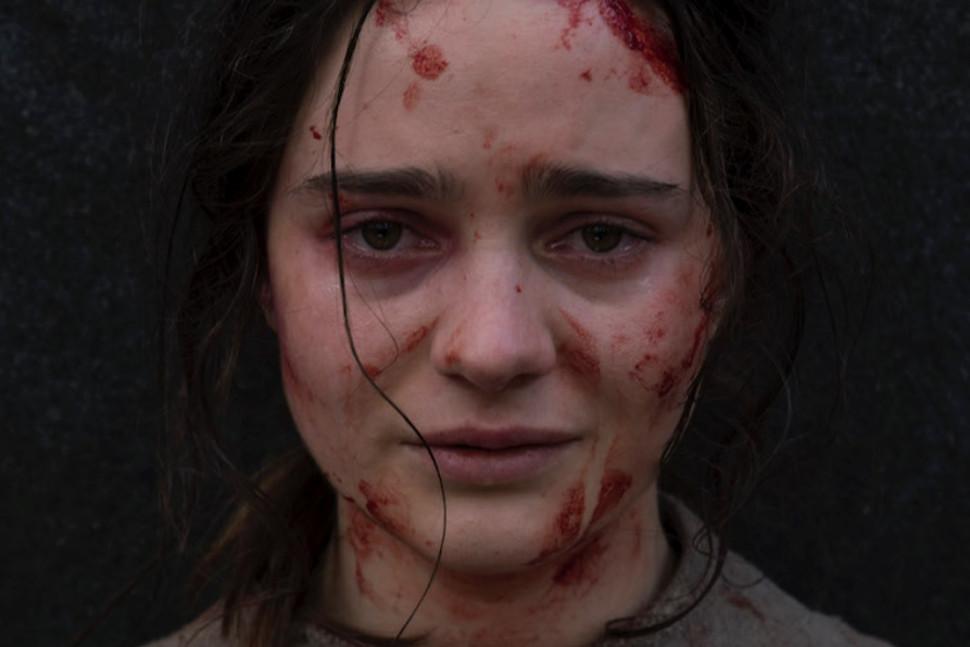When I review movies from film festivals, I like to write about the movies, not the screenings themselves. But before I tell this story I have to let you know about what kind of screening I was at this evening when Jennifer Kent’s new film “The Nightingale” played for the first time at the Venice Film Festival.
The Sala Darsena, where it was held, can accommodate 1,400 souls and it was about three-quarters full. The screening was for press and “accredited” fest-goers; there are other filmmakers and movie-affiliated people who come in with an “Industry Gold” pass. In other words, it’s what some would call an “elite” screening.
At the end of the film, after some occasions of applause that were themselves deeply disconcerting (and believe me I feel pretty ridiculous for feeling I ought not describe them on account of “spoilers”), the writer/director’s name, Jennifer Kent, came on screen. In the dark, one very angry male shouted a couple of very angry words that I couldn’t quite make out.
An acquaintance told me, outside the theater, that one of the words this fellow shouted out was “whore.”
That’s jaw-droppingly awful on the face of it. It’s worse when you remember that Kent is the only female film director in the festival’s competition this year. And I’m sure the angry shouter wanted those who heard him to appreciate what he must have considered a delicious irony: “Whore” is what the film’s female protagonist, Clare, is called over and over again in the course of almost 140 minutes by the film’s central villain.
Watching the movie itself, which takes place in early 19th century Australia, I often felt that Kent, whose “The Babadook” galvanized film lovers in 2014, was biting off more than she could reasonably chew with this ambitious, brutal movie. The story is of a young Irish convict named Clare (Aisling Franciosi, acquitting herself well in a marathon role) who’s subjected to horrific abuse by a British army lieutenant who’s responsible for her official supervision. After this monster takes from her everything she has, with extreme prejudice, he truculently sets out for a faraway town to claim a promotion. Hell bent on revenge, she follows, assisted by an Aboriginal tracker (Baykali Ganambarr, who’s great) whose very existence brings out Clare’s own bigotries big time. At first the movie seems like it could be a historical variant of “I Spit On Your Grave” with inserted teachable moments. That’s not, finally, what it is. (As it happens, the movie’s forest pursuit scenes often have a redolence of Werner Herzog, which is all to the good.)
The sadism of the lieutenant, played with apt ferocity by Sam Clafin, is literally bottomless, and the movie is unrelenting in its portrayal of white atrocities against black native Australians. I suspect Kent wants people to consider it too much—I think that’s part of the point of the movie.
But up until the end I felt that she was overestimating the amount of exasperation an audience ought to suffer, and several of the turns in the plot simply do not convince. When I was walking out of the movie, still shaken by the shout from the audience, I was behind a young man who was braying to his young friends about how awful he considered the film: “The movie thinks it’s so PROGRESSIVE, but it doesn’t even give the black guy any agency!” he yelled in disbelief. I was not part of his conversation so I didn’t have to worry about not knowing what to say to that. But what I said to myself was “Good God.”
And so finally I can’t complain about anything this movie had to say. With one angrily shouted word, one awful person proved that the central thesis of the movie, that the world is run by men who hate women, remains absolutely correct. This was a disheartening way to end my 2018 Venice experience. But don’t worry, I still love this city and this festival. But maybe there needs to be extreme vetting of who gets into the “elite” screenings. [Ed. – The heckler has since confessed, and Kent has responded. Read more about that by clicking here.]

The evening prior, I watched the new movie by Mexican director Carlos Reygadas, “Nuestro Tiempo.” It’s three hours long. It mostly takes place on a Mexican bull ranch and its main characters are played by Reygadas and his wife. It’s about a couple whose ostensibly open marriage is tested by the wife’s sexual involvement with an American ranch hand. It’s shot in spectacular color widescreen and features music by King Crimson and Genesis. If my description seems diffuse, that’s because, um, it is. It’s a movie I’m still processing. Maybe it’s best if I just describe how it made me feel.
About an hour into it, I was blown away. I was thinking, “This is awesome. This is the ‘2001: A Space Odyssey’ of adultery movies.” About two hours and twenty minutes in I was thinking “I’m in jail. I’m in jail with these people.” I should add that these timings are approximate: I was so engrossed with the movie, even during its frustrating sections, that I did not look at my watch at all until about five minutes from the end. I kind of want to see it again. And I kind of dread seeing it again. So you could say it was a decidedly mixed experience.












